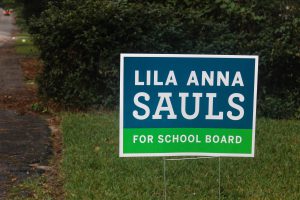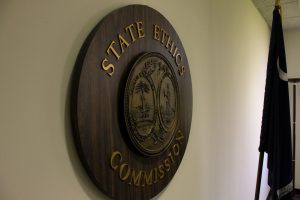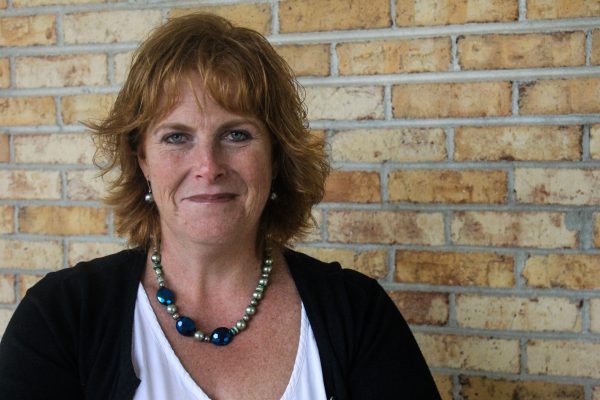One school board candidate employs shoe leather strategy to overcome fundraising deficit
by Reporting Students • November 4, 2016 • All Stories, Governing • 0 Comments
Local candidates employ all sorts of strategies to get the attention of voters. One Richland One candidate puts on her walking shoes.
By Collyn Taylor
Oct. 31, 2016
Lila Anna Sauls’s feet hurt.
The foot ache doesn’t stem from an injury or pre-existing condition. It’s from running for school board. She spends many of her nights and weekends on her feet bouncing from one event to the next trying to get votes, money or both.
Sauls is one of six candidates running for two open seats on the Richland County School District One school board. Her campaign, like any other, is oiled by donations.
The majority of her money comes from small, $25 donations from friends and family. She is currently reporting $525 in pledges to the South Carolina Ethics Commission.
But despite a solid monetary backing, the first-time candidate is in third place in fundraising by a wide margin.
The trailblazer this election is Avni Gupta-Kagan, who’s reported more than $28,000 in gifts to her campaign. That leaves Sauls and the others trying to keep pace against a staggering fundraising gap.
“It’s has forced the rest of us to get creative. I will not raise that much money for a school board campaign,” Sauls said. “It makes me have to work that much harder to figure out how to do more with less resources.”

One of Sauls’s signs in the community
To counter-balance that financial disparity, Sauls is attending events to increase her name recognition. Her opponents are able to spend more on traditional campaign items such as yard signs.
Sauls said she doesn’t think of the race as a monetary David-and-Goliath story. Her strategy is the cornerstone of her campaign, and she said she’s focusing on that more than money.
“I am at three events every night because I have to look at people and say, ‘I need you to hear me and I need you to understand what’s in my mind and my heart, and go tell ten of your friends,”’ she said. “It is what it is; I don’t have the money.”
Otha Dillihay Sr. is in second place with $1,100 raised while the remaining candidates—Darrell Black, Germon Miller and Donna Mack—have not reported any donations.
Each candidate must report all campaign donations to the State Ethics Commission, an agency that oversees how political contributions can be used. Michael Burchstead, the commission’s top lawyer, said the purpose of the law is to prevent wrongdoing and not to hamper candidates.

The emblem of the South Carolina Ethics Commission, which oversees campaign finance.
“You need to be able to pay for those signs, to pay for any help you may get,” Burchstead said. “You need to be able to get out on the airways or do direct mailers. That stuff costs money.”
While running for school board, the fundraising aspect can take center stage, and the cost for name recognition tools can be astronomical.
Gupta-Kagan, who spends 10 to 15 hours a week fundraising, says it costs $24,000 to produce and mail campaign fliers to 40,000 constituents.
“I want to be doing the door knocking and pounding the streets for voters but I have to do the fundraising,” she said during a telephone interview. “So it’s this back-and-forth balance of those things.”
Richland failed to meet a deadline for federal funding, missing out on $3.1 million for its students and there is an ongoing investigation about why the Aug. 15 deadline was missed and what the district can do to regain some of that money.
School Board member Beatrice King said she’s been keeping track of the election. While she won’t publicly endorse a candidate, Kings has opinions about each candidate and a hope that whomever is elected can focus on the right things.
“At the end of the day you have to find common ground so that the children are always the center of the discussion,” she said.
With Election Day looming for candidates, the focus shifts from looking at opponents as adversaries to seeing them as potential coworkers. Since there are two open seats on the board, two of the six candidates will serve four-year terms.
“You’re not shaping them up as a candidate any more,” Sauls said. “You’re shaping them up as someone who’s going to be one of seven sitting up there in the front of the room with you.”
While trying to not focus on the amount of money being raised, Sauls is relying on what she knows best: her strategy.
“Some people are going to have to spend more money to get name recognition because they haven’t been in the community,” Sauls said.
“It’s disturbing money can give people an advantage at this level, and it’s made me understand the political system so much better. But I can tell you… I am more comfortable thinking strategy is better than money.”

